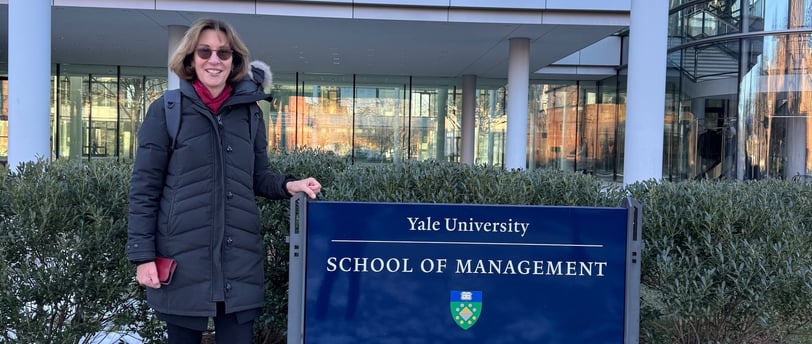Starting My Journey: Growth at Yale ELI and Beyond
Join me, Ellen Schmidt-Devlin, as I share my experiences at Yale's Experienced Leaders Initiative. This blog will capture my reflections and growth during this transformative period, and continue to explore my life's purpose in the years ahead. Let's navigate this journey together, inward, outward, and forward.
Ellen Schmidt-Devlin
2/5/20253 min read


Module 1: Experienced Leaders Initiative (ELI) New Haven, Connecticut -January 27-29, 2025
After spending 27 years at Nike across five different countries and the last 13 years at the University of Oregon, I decided it was time for a reset. I'm 67 years old and it is time to start counting down not up. How do I want to spend my last 20+ years on this earth. Frankly speaking, I have no idea. What I do know is that really smart people have been thinking about this for a very long time. For example, Marc Freedman, who co-founded the ELI program has spent his career researching and building bridges between the generations recognizing the value of each of us.
As I approach this idea of 'retiring' being last to what do I want to do next, I decided to start that journey with a community and a structure. The community is my cohort that consists of 25 accomplished individuals who are seeking their next as well. The structure is the Experienced Leaders Initiative at Yale University. All this type of program is done across other universities (e.g. Stanford, Harvard, Notre Dame, etc.), we are the inaugural class here at Yale. We are learning together who are we going to be and how do we prepare for this part of our live journey. The world has "Added years to life" and as JFK said, we know need to "Add life to these years".
DAY 1:
Marc started us on this journey with some positive role models on aging such as Dick Van Dyke at 100 years old performing in a video with Chris Martin from Cold Play and Jimmy Carter's 43 year encore career. I would add my personal heroines of Madeline Albright and RBG, and my list goes on. So there are some people we can use as role models as we determine what do I have to aspire to?
But as we learned in this first module is that there is no roadmap to show us how to live this last act. It will be up to us to create our own personal playbook.
Starting this learning journey with my ELI classmates and Marc Freedman as our guide, we found out out skills around relationships get stronger with age, and that it likely is not about having the answers but about having better questions. (That will take a bit more thinking.)
Module 1 has talented professors from Yale that help us begin our journey with more knowledge about the concept of longevity. Becca R. Levy is our first instructor, (Breaking the Age Code), showing us her research that discovered a relationship between how society treats older people and how long they live. Finding out that age beliefs contribute to longevity. In fact, people that have positive feelings about aging live on average 7.6 years longer than those with negative feelings. WOW!! That is enough to change behavior. In fact, after this lecture, I made the decision to no longer call myself or others old and to keep a positive outlook on the process of aging. (and to keep fewer mirrors in my house:-). I can't change our youth focused society but I can change me.
Becca helped me understand that agism is not only something others are doing, it can in fact be what I am doing. How do we find ways to celebrate aging?
Our next lecturer was Emma Suppälä. I read her book The Happiness Track. Emma led us through an exercise called Reflected Best Self. We all asked people from our lives to write 1-3 stories about when they have seen us at our best. The concept is similar to what I learned from Bill Bowerman when he coached me for the 1980 Olympics, which is focus on building your strengths not eliminating your weaknesses. We were each given our packet of stories before the session so we had the chance to read and reflect on what others were telling us about ourselves. Reading stories from colleagues, friends, and family touched my heart in a very special way. These were stories I either didn't remember or remembered them differently where I was far from my Best Self.
Emma guided us with "Be as kind to yourself as you are to others", and leave the concept of self-criticism behind. She described it as the belief that confronting yourself will make you meet higher standards, but if you focus on what is wrong, this doesn't lead to high performance but to anxiety, depression, and fear of failure. She focused us on the concept of "Self-Compassion" with being kind to yourself which leads to increased happiness, creativity, better health, and enhanced willpower.
Emma's suggestions for how to practice self compassion included using a personal "self-compassion" phrase (I use "You are still good enough"), and make a daily gratitude list. She talked about positive leaders filling your cup, enhancing energy by serving others, and having good boundaries.